One of the hardest things about public speaking is knowing how to start a speech. Your opening line is your first impression. It’s how you capture attention. It’s how you captivate the audience. So how do you make sure you nail it every time?
The best way to know how to open a speech is to look at what has worked in the past. When we examined the top speeches of all time and the most popular TED talks of all time, we found some interesting speaking patterns.
Time has identified the top 10 greatest speeches of all time. They are:
Opening Lines of the Top 10 Greatest Speeches of All Time
#1: Socrates – “Apology”
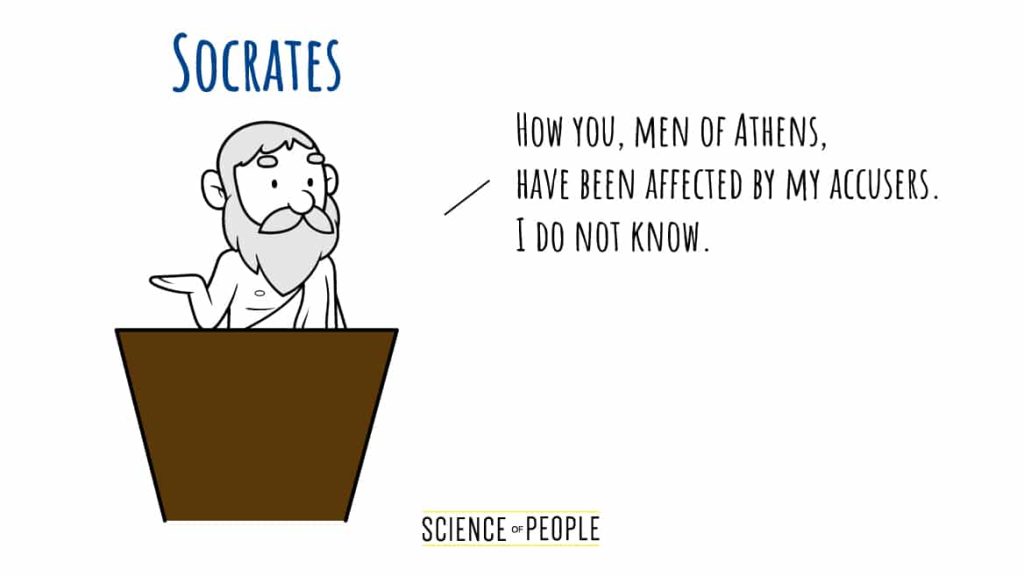
#2: Patrick Henry – “Give Me Liberty or Give Me Death”
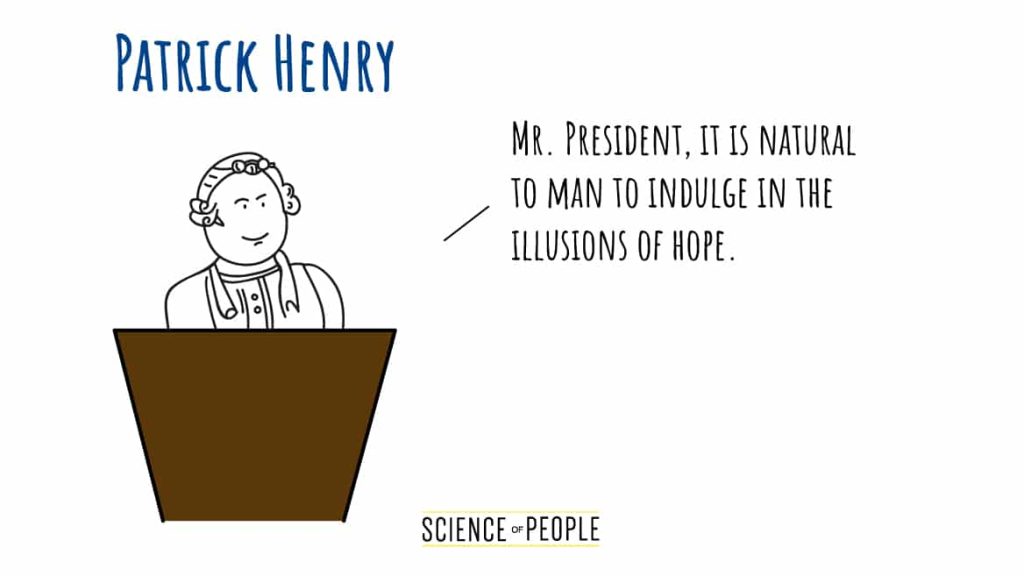
#3: Frederick Douglass – “The Hypocrisy of American Slavery”
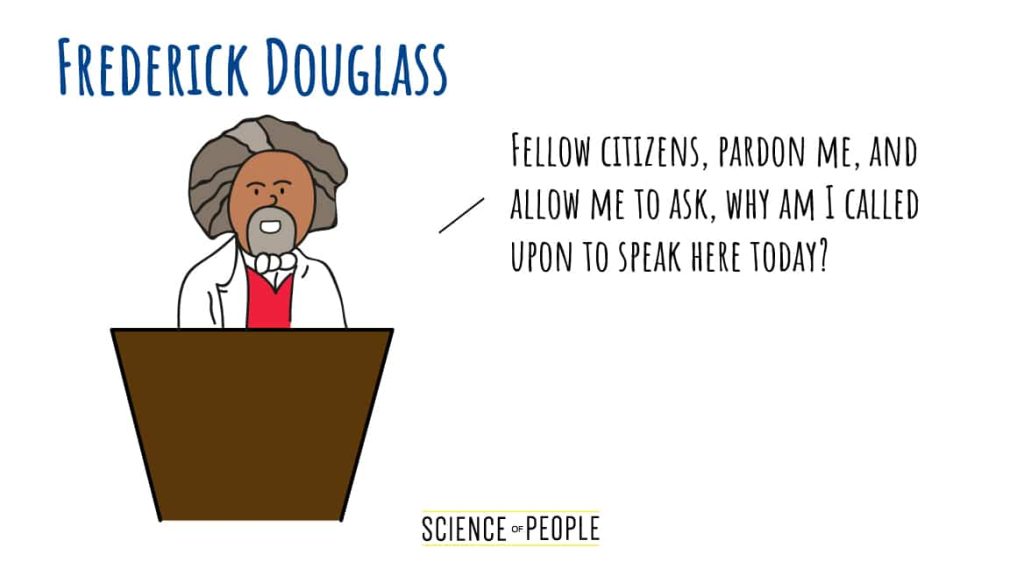
#4: Abraham Lincoln – “Gettysburg Address”
Opening Line: “Fourscore and seven years ago our fathers brought forth on this continent a new nation, conceived in liberty and dedicated to the proposition that all men are created equal.”
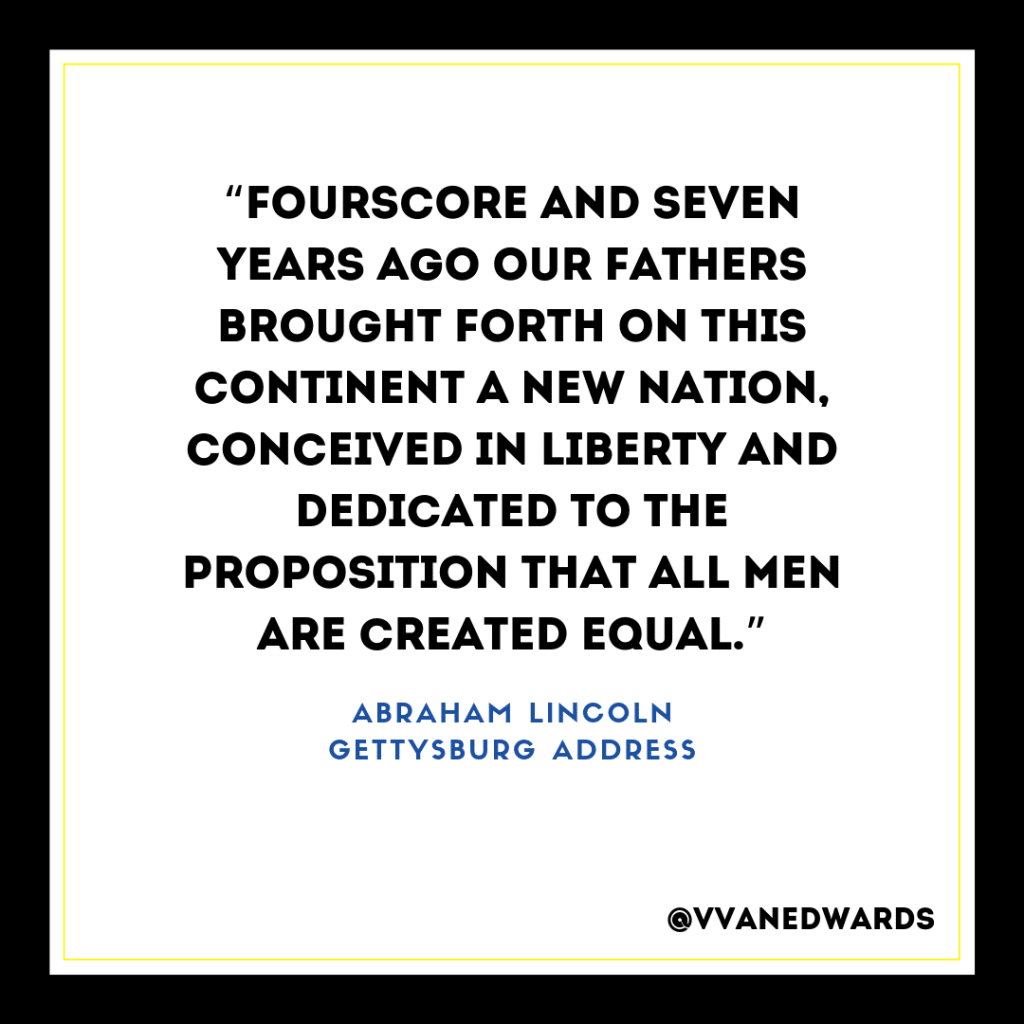
#5: Susan B. Anthony – “Women’s Rights to the Suffrage”
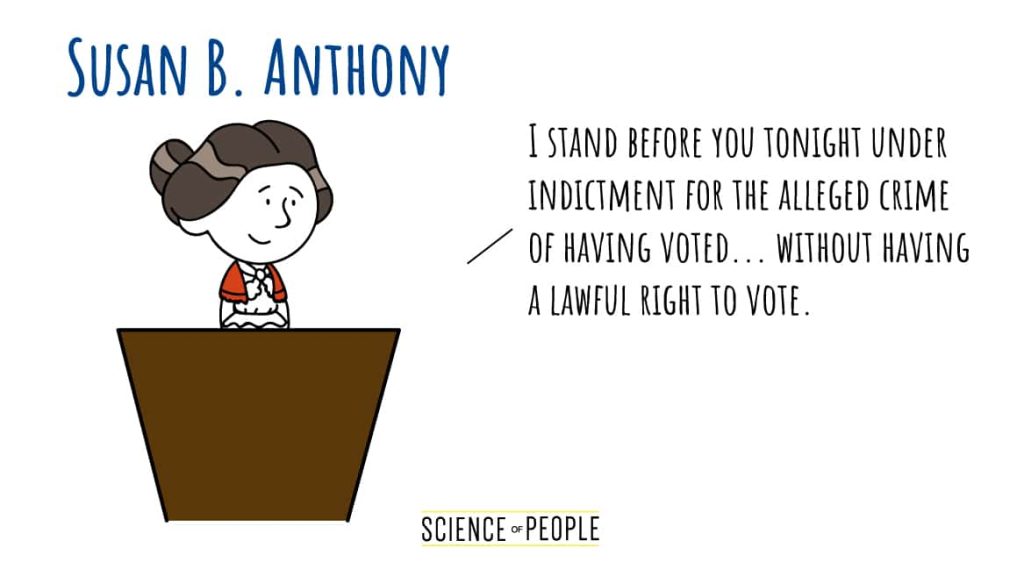
#6: Winston Churchill – “Blood, Toil, Tears, and Sweat”
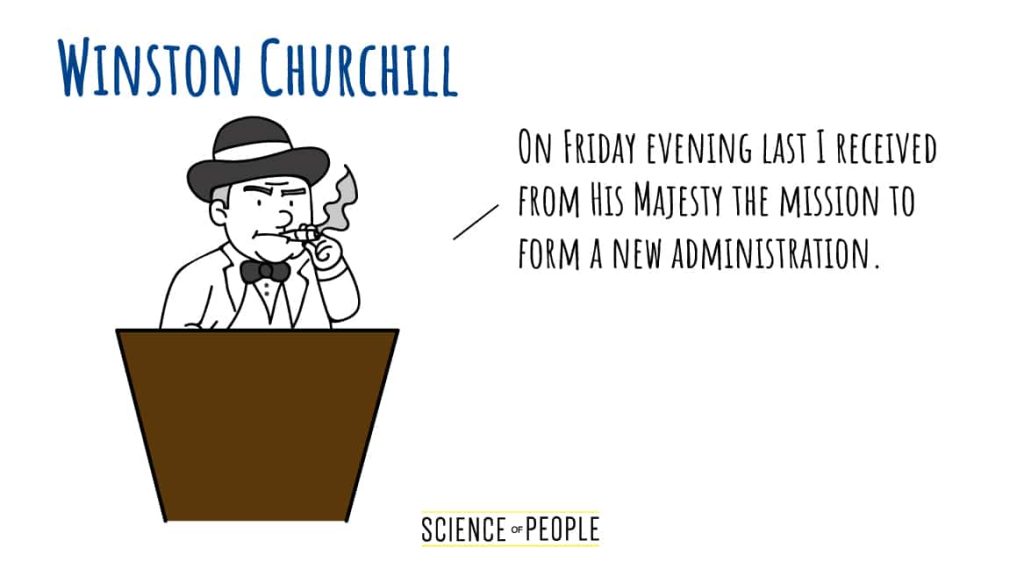
#7: John F. Kennedy – “Inaugural Address”
Opening Line: “We observe today not a victory of party, but a celebration of freedom — symbolizing an end, as well as a beginning — signifying renewal, as well as change.”
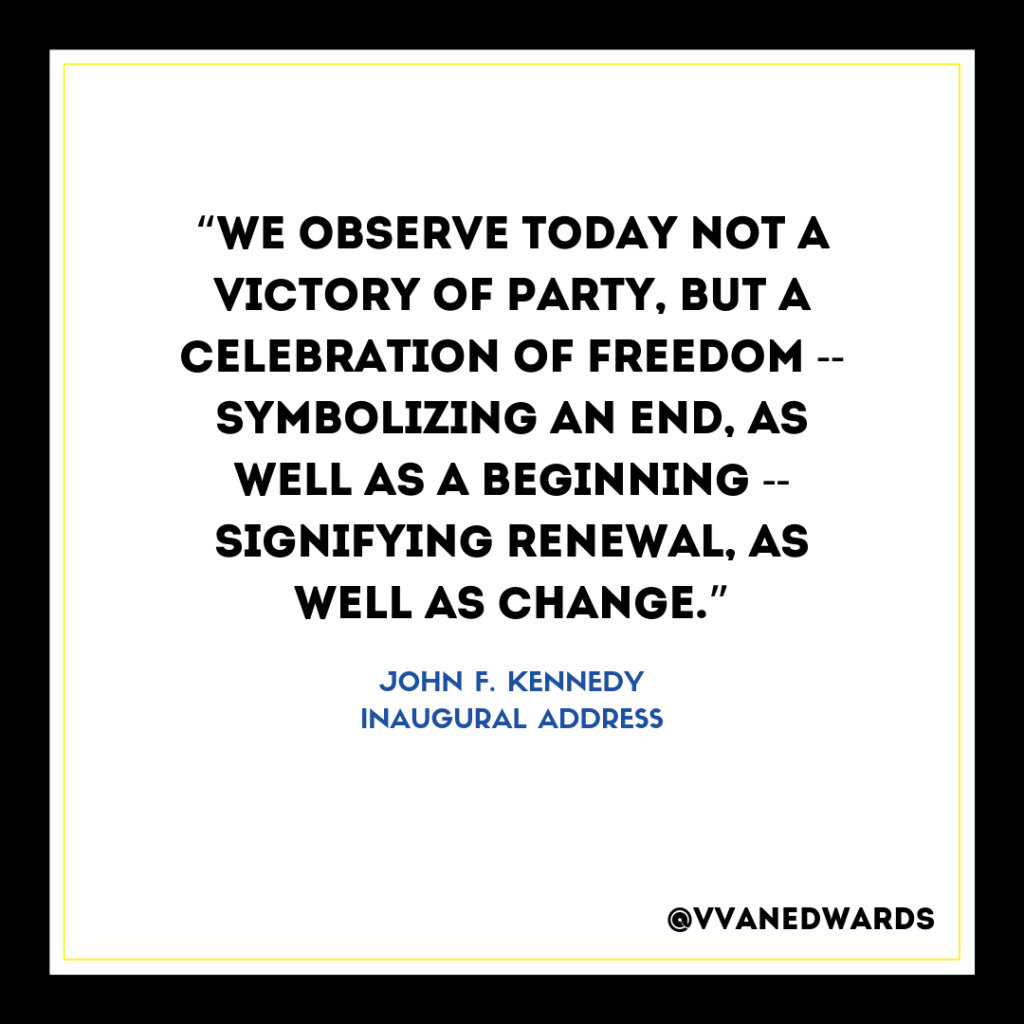
#8: Martin Luther King, Jr. – “I Have a Dream”
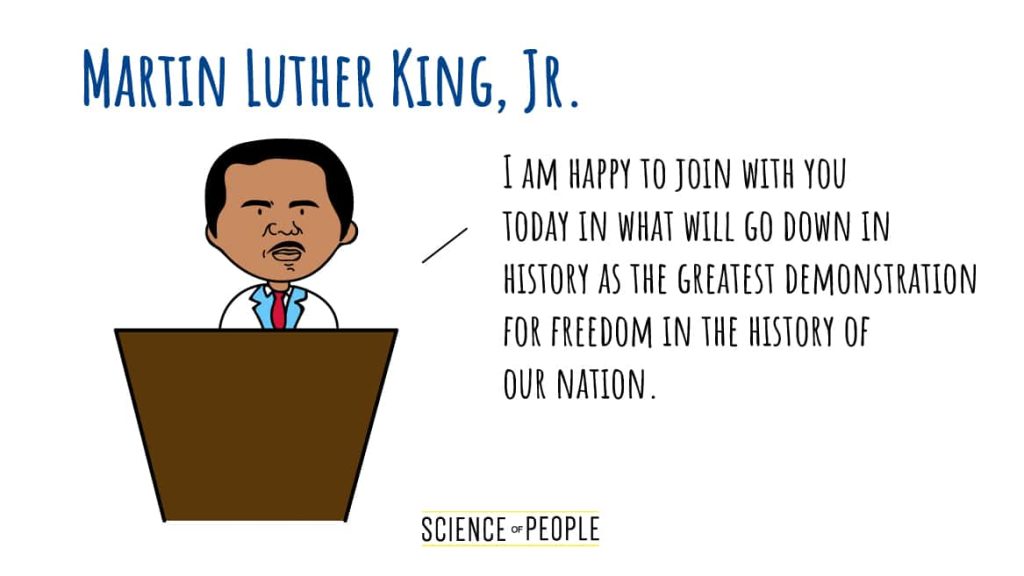
#9: Lyndon B. Johnson – “The American Promise”
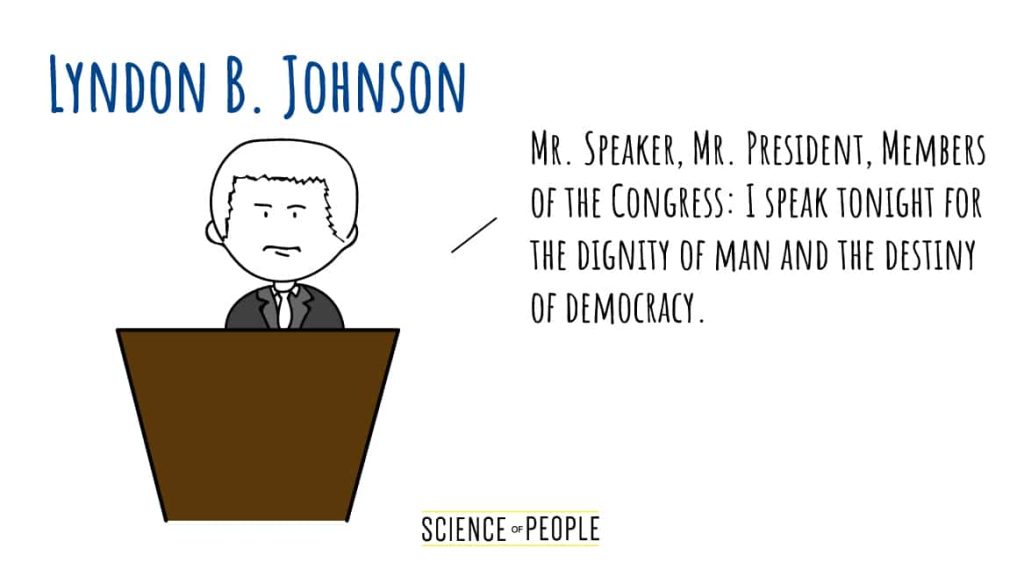
#10: Ronald Reagan – “Remarks at the Brandenburg Gate”
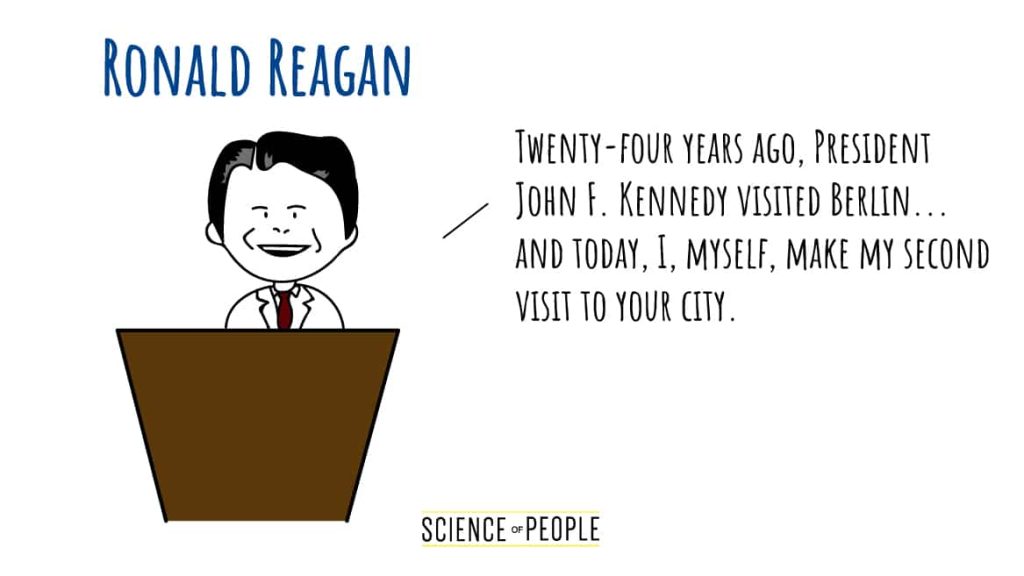
How do all of these historical greats start their speeches? Is there a difference between these and some of the more modern top TED talks?
Before we dive in, let’s recap with some critical do’s and don’ts when opening a speech:
Opening Lines of the Top 10 TED Talks of All Time
Here are the opening lines to the top 10 Ted Talks of all time according to view count:
#1: Sir Ken Robinson – “Do schools kill creativity?”
Opening Line: “Good morning. How are you? It’s been great, hasn’t it? I’ve been blown away by the whole thing. In fact, I’m leaving.”
#2: Tim Urban – “Inside The Mind of a Master Procrastinator”
Opening Line: “So in college, I was a government major, which means I had to write a lot of papers.”
#3: Simon Sinek – “How Great Leaders Inspire Action”
#4: Brene Brown – “The Power of Vulnerability”
Opening Line: “So, I’ll start with this: a couple years ago, an event planner called me because I was going to do a speaking event.”
#5: Mary Roach – “10 Things You Didn’t Know About Orgasm”
Opening Line: “All right. I’m going to show you a couple of images from a very diverting paper in The Journal of Ultrasound in Medicine.”
#6: Julian Treasure – “How to Speak so that People Want to Listen”
Opening Line: “The human voice: It’s the instrument we all play.”
#7: Jill Bolte Taylor – “My Stroke of Insight”
Opening Line: “I grew up to study the brain because I have a brother who has been diagnosed with a brain disorder: schizophrenia.”
#8: James Veitch – “This is What Happens When You Reply to Spam Email”
Opening Line: “A few years ago, I got one of those spam emails.”
#9: Cameron Russell – “Looks Aren’t Everything; Believe Me, I’m a Model”
Opening Line: “Hi. My name is Cameron Russell, and for the last little while, I’ve been a model.”
#10: Dan Pink – “The Puzzle of Motivation”
Opening Line: “I need to make a confession at the outset here.”
What can we learn from these opening lines? There are some patterns that can help us. First, let’s start with what you shouldn’t do. Have you ever made one of these cardinal speaking sins?
Never Start a Presentation with…
Anything technical! This is a big mistake people make when they have not done a tech check ahead of time or are feeling nervous. Never start with these openers:
- Is this microphone working?
- Can you hear me?
- Wow, these lights are bright!
Your nervousness. Many people think it is vulnerable to start with how nervous they are about speaking — you can mention this later, but it should not be the first thing. Why? People will then only be looking for signs of your nervousness. Don’t start with:
- I’m so nervous right now!
- Wow there are so many people here.
- I’m not a great public speaker.
A lackluster or non-believable nicety. It’s great to be grateful to the person who introduced you, but it’s not a great way to include the audience. It’s ok to thank the audience for being there—but do it at the end (not as your opening line). These are all too boring:
- Thanks for having me.
- Thanks for that intro.
- Nice to be here.
Boring, shmoring! I have an exception here if you can make it funny. Ken Robinson started with a nicety and then turned it into a joke. He said, “ “Good morning. How are you? It’s been great, hasn’t it? I’ve been blown away by the whole thing. In fact, I’m leaving.”
More Public Speaking Resources
Get even more public speaking tips with our related resources:
- 10 Presentation Ideas that will Radically Improve Your Presentation Skills
- 6 Public Speaking Apps to try Before Your Next Presentation
- My Top 5 Favorite Public Speakers
- 15 Science-Based Public Speaking Tips To Become a Master Speaker
- How to Give Captivating Presentations
- How to Give an Awesome Toast
How to Start a Presentation
A story. The absolute best way to start a presentation is with a story. There is nothing better to capture the imagination and attention of an audience. Try to use these speaking openers as fill-in-the-blanks for your speech.
- I’m here for a reason. And it’s an interesting story…
- The best thing that ever happened to me was…
- Once upon a time…
In his talk, “The lies our culture tells us about what matters,” David Brooks started off with a great opening line AND a story. He said, “So, we all have bad seasons in life. And I had one in 2013. My marriage had just ended, and I was humiliated by that failed commitment.” Makes you want to watch right…
And if you need help on storytelling basics, be sure to check out some of my top 5 favorite speakers.
A BIG idea. Sometimes you want to share your big idea right up front. This can be helpful because it is intriguing and gets people clued in right away. All TED speakers try to integrate their big idea early.
- You’re here for a reason. It’s…
- The single most important thing I want to share with you today is…
- Today, I want to share a big idea…
I love how Stacy Smith starts off her talk with her big idea framed in an interesting way. She said, “Today, I want to tell you about a pressing social issue. Now, it’s not nuclear arms, it’s not immigration, and it’s not malaria. I’m here to talk about movies.”
Special Note: Be very careful to NOT deliver your one-liner by re-reading your title slide. You also want to position it as exciting and intriguing. For example, don’t say, “Today I am going to talk about body language.” Instead say, “Today I am going to teach you the single most important thing you can do to improve your charisma… and it starts with your body.”
A quirky one-liner. If you can use humor — do it! Humor or curiosity is a great way to start a speech on a high. You can get creative with these! Think of an interesting fact about you, your audience or your topic that can lead you into your content.
- One thing most people don’t know about me is…
- A teacher, a mother and a duck walk into a bar…
- I want to tell you something surprising.
When I gave my TEDx London Talk I started off with a quirky one-liner that immediately got a few laughs. It was “Hi, I’m Vanessa and I am a recovering awkward person.” It worked so well it is also the first line of my book, Captivate.
II love the way Eve Ensler opens her speech with an interesting one-liner: “For a long time, there was me, and my body.”
This is a great tip from Conor Neill. He says that it is great to start with a question that the audience is asking themselves or would be very curious to know the answer to. This might be phrasing a pain point or worry for your audience.
- Do you ever worry about…?
- Have you ever wondered…?
- You might have always thought…
See Cono Neill’s examples here:
Did you know…? Any interesting factoid or curiosity is bound to intrigue your audience. This is great if it leads into your content or a story. I like to start with did you know… Here are some that I use. You will have to fill in the blank for your audience:
- Did you know that it takes less than a second to make a first impression?
- Did you know that your nonverbal communication is 12.5 times more powerful than your words?
- Did you know that we are lied to 200 times a day?
Jamie Oliver does this amazingly in his TED Talk. He starts with this mind-blowing fact, “Sadly, in the next 18 minutes when I do our chat, four Americans that are alive will be dead through the food that they eat.”
Hopefully these opening lines will give you some ideas to use to open your speech.
How to End a Speech: My Favorite Closers
Do you know how to end on a high? Leave a lasting impression in your presentation? Science tells us that the first and last parts of your presentations are the most important. Get our FREE download to get our closer guide.
BONUS How to Choose the Right Opener
You now have a toolbox full of great opening techniques—a story, a question, a big idea. But how do you know which tool to use? The “best” opener isn’t universal; it’s the one that’s best for the specific audience in front of you and the goal of your speech.
Before you choose your opener, ask yourself: “Who am I talking to, and what do I want them to feel?”
- To Inform an Expert Audience (Goal: Credibility): These are people who already know the basics. Don’t waste their time. Your best bet is to start with a startling statistic or your single biggest, most counterintuitive idea. They want new, credible information that challenges their thinking.
- Example: “Did you know that 86% of employees cite ineffective communication for workplace failures? Today, I want to show you the single biggest reason why.”
- To Persuade a Skeptical Audience (Goal: Rapport): This audience has their arms crossed (literally or figuratively). You can’t lead with a bold claim; you have to build trust first. Start with a relatable personal story that shows vulnerability or a question that validates their primary pain point. You need to find common ground before they’ll even consider your argument.
- Example: “Have you ever sat through a meeting and felt like it could have been an email? I know I have. In fact, one of the worst meetings of my life led to a discovery…”
- To Entertain a Friendly Audience (Goal: Energy): This group is already on your side (think an after-dinner speech or a talk to your own team). They are ready to have a good time. Start with a quirky one-liner, a bit of humor, or an interactive question. Your goal is to match and elevate their positive energy from the very beginning.
- Example: “I want to tell you something surprising. For the first half of my life, I was a recovering awkward person…”
- To Inspire a General Audience (Goal: Emotion): For a large, diverse audience like a graduation ceremony or a major conference, you need to tap into universal human emotions. Start with a powerful, archetypal story about struggle and triumph or an aspirational question that makes them think about their own potential.
- Example: “What would you do if you knew you could not fail?
Want more ideas? Read on: Best Shark Tank Pitches: 11 Secrets to Win Big


